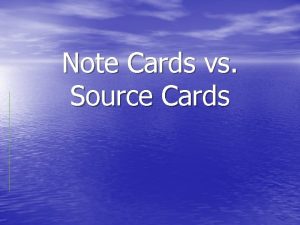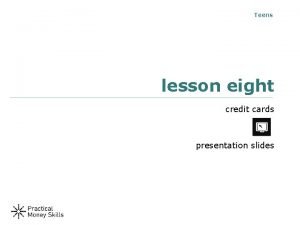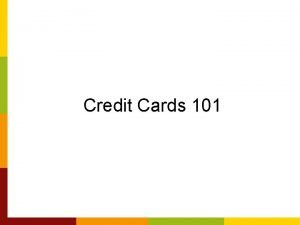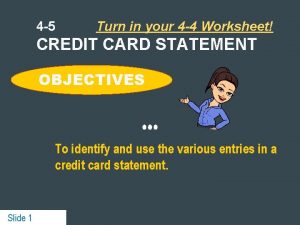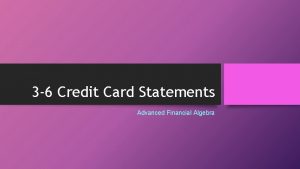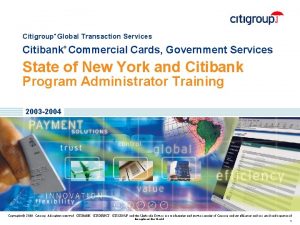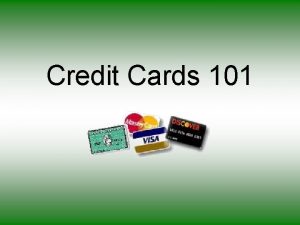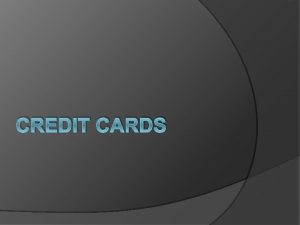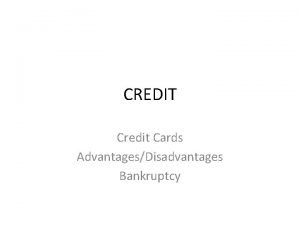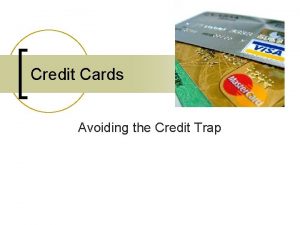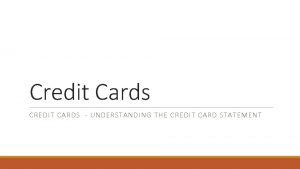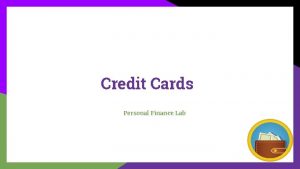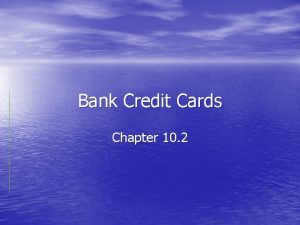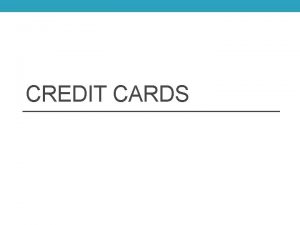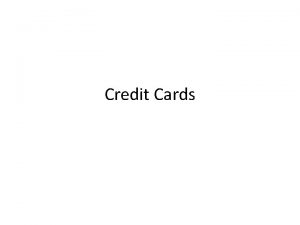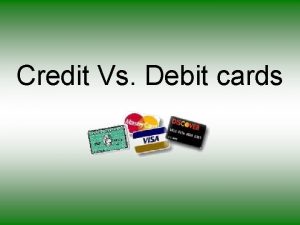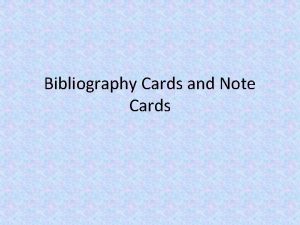Credit Cards Credit Types of Credit Credit the















- Slides: 15

Credit Cards


Credit & Types of Credit • Credit – the process of creating a loan • Borrower has to repay the principle of the loan + interest • Installment Credit – loan with a fixed number of payments over time • school, car, or home loans • Revolving Credit – arrangement that allows borrower to withdraw and repay loans repeatedly over time • Credit cards are the most common form of revolving credit • Easy access to loans BUT usually at high interest rates

Important Credit Card Vocab • Annual fee - fee you pay per year in order to keep your credit card. • Annual percentage rate (APR) - percent charged every year on top of any outstanding payments currently on your card • Credit line - maximum amount of money that can be charged to a given credit card account at any given time • Balance - amount owed on the card (amount spent + interest accrued) • Minimum payment - smallest amount you can pay toward your credit card bill • Can be easy to get in habit of paying only minimum amount and not the entire balance owed can lead to debt • Compound interest • This happens when you fail to make the minimum payment in full • Happens when you have a balance on credit card o Credit limit and interest rate (APR)are determined from a person’s credit score. o Credit cards can be paid off over time (based on a minimum payment ) or in full at any time.

Credit Scores (FICO) • Determines your eligibility for loans and credit cards • Scores range from 300 to 850 • Poor credit scores = high interest rates or no access to loans • Most important components of a person’s score are • Payment history & debt to income ratio • Other components • Length of credit history, new credit open, types of credit

Practice Credit Score Scenarios 1. You’ve been eager to buy a new cell phone for months, and now you’re ready to make it happen. You use your credit card to purchase the phone and you set up automatic billing to pay the monthly expenses. At the end of each month, you pay the credit card bill in full. a) Does your credit score go up or down? Why does it go up or down? If your score goes down, how can you fix it? 2. It’s Black Friday and you recently signed up for a new credit card with a $1000 credit limit. You purchase all of your gifts and hit the sales. By the end of the day, you have spent $996. 75. a) Does your credit score go up or down? Why does it go up or down? If your score does down, how can you fix it?

Practice Credit Card Scenarios • Use the bankrate. com credit card calculator to help you answer each question 1. Consider you used your credit card with 20% interest and spent $5000 with the card. Your minimum payment is $100. How long will it take to pay off the card if you pay only the minimum each month? How much will you spend on interest? 2. Consider you pay off the above credit card with a fixed payment of $150 each month. How long will it take to pay off the loan? How much will you spend on interest?

Loans

Loan Basics • Borrowing money for a fee from a financial institution. • Used when you want to make a big purchase • Car • House • Tuition • Principle, Interest, & Term • Principle = base amount borrowed • Interest (APR/APY) = borrowing rate fee • Many factors determine rate • Term = length of loan/repayment

Loan Payment • Some loans need a down payment before loan is given. • Car (varies on credit score & interest rate) & home loans (3. 5% minimum to 99%) • Loans are calculated with a loan amortization schedule. • The schedule will show the monthly payment, as well as the total cost of the loan. • Down payment, interest rate, & term all affect the loan payment • Early payments consist mostly of interest, with only a small amount of principal. • Later payments consist mostly of principal.

Student Loans • Subsidized Loans • Gov’t pays interest while the loan is in deferment • While student is in school and 6 months after – no interest is accrued • Can wait to pay until you graduate • Unsubsidized Loans • Interest is added to loan once the loan is accepted • Best to pay even while in school • Loan forgiveness • Can have loans forgiven if you go into certain fields • Gov’t or certain agencies – loan forgiveness after paying your payment for 10 years • Teacher loan forgiveness – after teaching in low-income or Title 1 schools for 5+ years can have loans forgiven up to a certain amount


What to consider when picking a loan • What is it for? • Do you have all the proper paperwork? • Do you have to put any money down and if so how much? • How long do you want to pay off the loan for? • AND MOST IMPORTANTLY…. • How much can you afford to pay each month?

Calculating Loan Payments & Interest

Use the appropriate loan calculator for the question. You buy a house for $250, 000. You make a down payment of $10, 000. The rest of the purchase is financed with a 30 -year fixed rate mortgage. (Use bankrate. com to help you find the answer) a) Based on the current rates (4. 37%), how much will the house cost? i) How much will you spend on interest over the course of the loan? b) If the purchase above was financed with a 15 -year fixed rate mortgage. Based on the current rates(4. 37%), how much will the house cost now? i) How much will you spend on interest over the course of the loan?
 Source cards definition
Source cards definition Lesson eight credit cards
Lesson eight credit cards Advantages and disadvantages of debit card
Advantages and disadvantages of debit card Credit cards 101
Credit cards 101 4-5 credit card statement worksheet answers
4-5 credit card statement worksheet answers 3-5 credit cards financial algebra
3-5 credit cards financial algebra Lamination plates for credit cards
Lamination plates for credit cards Citibank commercial card
Citibank commercial card Credit card 101
Credit card 101 Hát kết hợp bộ gõ cơ thể
Hát kết hợp bộ gõ cơ thể Bổ thể
Bổ thể Tỉ lệ cơ thể trẻ em
Tỉ lệ cơ thể trẻ em Voi kéo gỗ như thế nào
Voi kéo gỗ như thế nào Tư thế worms-breton
Tư thế worms-breton Chúa sống lại
Chúa sống lại
